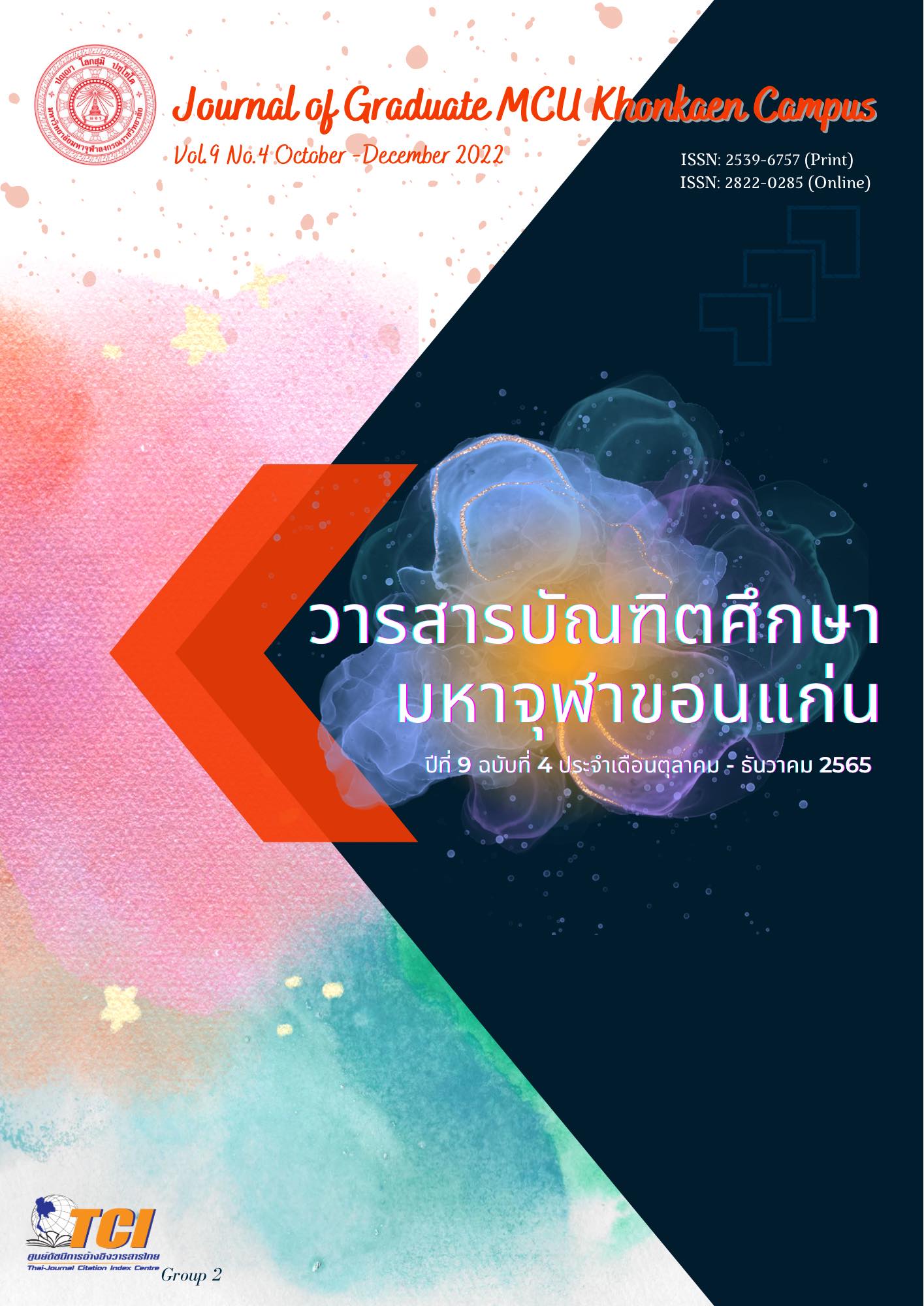การวิเคราะห์พุทธจริยศาสตร์ในประเพณีฮดสรงของตำบลกุดปลาดุก อำเภอชื่นชม จังหวัดมหาสารคาม
Main Article Content
บทคัดย่อ
การวิจัยครั้งนี้มีวัตถุประสงค์เพื่อ 1) ศึกษาหลักพุทธจริยศาสตร์ในประเพณีฮดสรง 2) ศึกษาหลักพุทธจริยศาสตร์ในประเพณีฮดสรงของตำบลกุดปลาดุก อำเภอชื่นชม จังหวัดมหาสารคาม 3) วิเคราะห์พุทธจริยศาสตร์ในประเพณีฮดสรงของตำบลกุดปลาดุก อำเภอชื่นชม จังหวัดมหาสารคาม การวิจัยครั้งนี้เป็นการวิจัยเชิงคุณภาพ ศึกษาข้อมูลจากพระไตรปิฎก เอกสาร และงานวิจัยที่เกี่ยวข้อง มีผู้ให้ข้อมูลสำคัญจำนวน 28 รูป/คน วิเคราะห์ข้อมูล แบบวิธีพรรณนาตามหลักอุปนัยวิธี
ผลการวิจัยพบว่า
1) พุทธจริยศาสตร์ในประเพณีฮดสรง เป็นหลักจริยศาสตร์ที่พระพุทธเจ้าทรงสอนให้พุทธศาสนิกชนนำไปใช้ในการดำเนินชีวิตอยู่ด้วยปัญญา เพื่อทำให้ผู้ที่ประพฤติปฏิบัติตามอยู่ในสังคมอย่างมีความสุข ซึ่งหลักพุทธจริยศาสตร์ในประเพณีฮดสรง ได้แก่ (1) สังคหวัตถุ 4 (2) ทิศ 6 (3) อปริหานิยธรรม
2) ประเพณีฮดสรงของตำบลกุดปลาดุก เป็นประเพณีที่จัดขึ้นเพื่อยกย่องพระสงฆ์ผู้ที่ประพฤติดี ปฏิบัติชอบ มีจริยาวัตรที่น่าเลื่อมใส เป็นกิจกรรมที่จัดขึ้นกันในระดับชาวบ้าน เพื่อประโยชน์ร่วมกันทุกฝ่าย
ในชุมชน ซึ่งนิยมทำในเดือนเมษายนหรืออาจจัดทำขึ้นในช่วงงานบุญตามประเพณี
3) การวิเคราะห์พุทธจริยศาสตร์ในประเพณีฮดสรงของชาวบ้านตำบลกุดปลาดุก เป็นกิจกรรมที่เกิดขึ้นต้องอาศัยความสามัคคีของคนในชุมชนเป็นอย่างมาก ถือเอาประเพณีฮดสรงนี้เป็นการทำบุญ
ให้ทานไปในตัว มีการถวายเครื่องกองฮด การแบ่งปันสิ่งของด้วยความเอื้อเฟื้อเผื่อแผ่ ช่วยเหลือสงเคราะห์ด้วยวัตถุสิ่งของตลอดจนให้ความรู้ ความเข้าใจการบูชาสิ่งที่ควรกราบไหว้บุคคลที่ควรบูชาเพื่อเป็นการ
ให้กำลังใจแก่ผู้ที่ทำหน้าที่ประกาศสืบทอดพระพุทธศาสนาต่อไป
Article Details

อนุญาตภายใต้เงื่อนไข Creative Commons Attribution-NonCommercial-NoDerivatives 4.0 International License.
เอกสารอ้างอิง
ธนากิต. (2536). ประเพณี พิธีมงคล และวันสำคัญของไทย. กรุงเทพฯ: ชมรมเด็ก.
ธีรพงษ์ มีไธสง. (2556). ฮดสรง : การอนุรักษ์ภูมิปัญญาพื้นบ้านเพื่อการพัฒนาพิธีเถราภิเษกพระสงฆ์ในภาค อีสาน. (วิทยานิพนธ์ปรัชญาดุษฎีบัณฑิต). มหาสารคาม: มหาวิทยาลัยมหาสารคาม.
ปรีชา พิณทอง. (2534). ประเพณีโบราณ. อุบลราชธานี: ศิริธรรมออฟเซ็ท.
พระครูเมตตากิตติวิมล (อภัย อภโย). (2555). การศึกษาวิเคราะห์ความเชื่อในประเพณีฮดสรงของชาวตำบลป่าสังข์ อำเภอจตุรพักตรพิมาน จังหวัดร้อยเอ็ด. (วิทยานิพนธ์พุทธศาสตรมหาบัณฑิต). พระนครศรีอยุธยา: มหาวิทยาลัยมหาจุฬาลงกรณราชวิทยาลัย.
พระมหาปณิธาน สุเมโธ (เป็งอิ่น). (2563). มโนทัศน์ความเป็นบัณฑิตตามหลักพุทธปรัชญาเถรวาท.(วิทยานิพนธ์ศาสนศาสตรมหาบัณฑิต). พระนครศรีอยุธยา: มหาวิทยาลัยมหามกุฎราชวิทยาลัย.
มหาจุฬาลงกรณราชวิทยาลัย. (2539). พระไตรปิฎก ฉบับภาษาไทย มหาวิทยาลัยมหาจุฬาลงกรณราชวิทยาลัย. กรุงเทพฯ: มหาจุฬาลงกรณราชวิทยาลัย.
วสิน อินทสระ. (2549). พุทธจริยศาสตร์. (พิมพ์ครั้งที่ 2). กรุงเทพฯ: เม็ดทราย.
สำลี รักสุทธี. (2544). สืบสานตำนานงานบุญประเพณีอีสาน. กรุงเทพฯ: พัฒนา ศึกษา.

